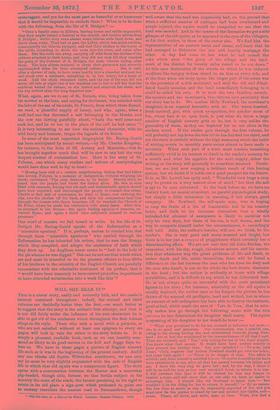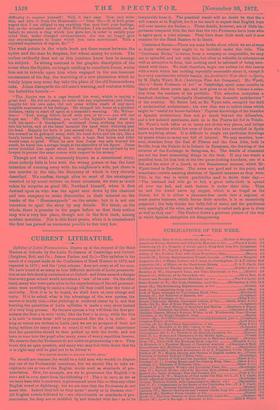WILL SHE BEAR IT?*
Tnis is a clever story, easily and naturally told, and the reader's interest sustained throughout; indeed, the second and third volumes are decidedly better than the first,—so much better as to suggest that the story is the author's first attempt, and that it is not till fairly under the influence of his own characters he is able to get rid of the crudeness which throughout the first volume clings to his style. Those who seek a novel with a purpose, or who are not satisfied without at least one epigram to every six pages, will look in vain for either in the story before us. It is simply a pleasant, readable book, such as we can heartily com- mend as likely to do good service in the dull and foggy days be- fore us. We have in these pages a picture of English country life such as it was in the beginning of the present century. And if any one thinks old Squire Wilverden overdrawn, we can only say he must be very slightly acquainted with the side of English life in which that old .squire was a conspicuous figure. The story opens with a conversation between the Rector and a somewhat pig-headed, though able, farmer, on that fertile subject in the country the state of the roads, the farmer persisting in his right to retain in its old place a sign-post which professed to point out to unwary travellers the nearest road to Summerdown, though • Will She Bear Ii: a Tale of the Weald. London: Samuel Tinsley. 1872.
well aware that the road was impa=sably bad, on the ground that when a sufficient number of carriages had been overturned and people injured, the squire would be compelled to see that the road was mended. And in the course of the discussion we get a aide glimpse of the old squire, as he appeared in the eyes of the villagers, or for that matter, in those of the rector also. We find him the representative of an ancient name and estate, and learn that he had managed to dishonour the one and heavily mortgage the other. A day had come at last when he had caused the oaks which were "the glory of the village and the land- mark of the district for twenty miles round to be cut down.' At this open declaration of the straits to which he was reduced creditors like hungry wolves closed in on him on every side, and
at the time when our story opens the larger part of his estate was-
in the posessiou of a rich merchant, and only the old and dilapi- dated family mansion and tho land immediately belonging to it could be called his own. It is with the two families, namely, the squire's and the merchant's, thus thrown into proximity that our story has to do. We confess Milly Newland, the merchant's daughter, is an especial favourite with us. The warm-hearted, fresh-natured, girl, with quick sympathies, but quicker sense of fun, whose face is an open book, is just what we know a largo number of English country girls to be, but is very unlike the generality of them, as they are depicted for us too often in the modern novel. If the reader gets through the first volume, he- will probably not lay down the tale till he has finished the third, and
yet the story is entirely without the high seasoning which the habit of writing novels in monthly parts seems almost to have made a.
necessity. When each Part of a work must contain something sufficiently vivid in its interest to dwell in the reader's memory for- a month and whet his appetite for the next supply, either the
writing or the story will generally be somewhat strained. Doubt- less, we are just now reaping a brilliant result of this forcing
system, but we doubt if it holds out a good prospect for the future. It is, as Mr. Lowell has aptly said, "Wonderful how large a crop-
may be grown on a very narrow close of mind," but then the soil is apt to be soon exhausted. In the book before us, we have no- literary feast, no mental stimulant, no paiufulpsychological study, but simply a little relaxation in amusing, if not always, good company. Mr. Newland, the self-made man, who is hoping to reap the fruits of a life of honourable toil in his country home, and finds to his immense discomfort that a wholly unlooked-for element of annoyance is likely to embitter not, only his own days, but those of his son, is wall drawn, and the way he comports himself under the circumstances, is exceedingly
well told. Alice, the author's heroine, will not, we think, be the reader's. She is very good and warm-hearted and bright, but there is in her just a soupcon of priggishness which certainly has a disenchanting effect. We are not sure that old John Borden, the-
carpenter, with his shy, rough, chivalrous nature, and his convic- tion that whichever way the great problems of life and death, or rather death and life, settle themselves, there will be found a difference at the last between the man who has done his duty and
the man who hasn't, is not on the whole the best drawn character- in the book ; but the author is evidently at home with village
notabilities, and it is difficult to say which he has delineated best. He is not always quite so successful with the more prominent figures in his story ; for instance, admirably as the old squire is usually depicted, the author once so far forgets the picture he has drawn of the sensual old profligate, hard and wicked, but in whom no amount of self-indulgence has been able to destroy the instincts, good or bad, which mark the race of 'Vere de Vero,' that he actu- ally makes him go through the following scene with the rich
parvenu he has determined his daughter shall marry. The squire is speaking of his daughter to her would-be lover :— " 'What you promised to do for me, seemed to influence her most,— she is so good and generous. Our conversation was a painful one, owing to the strong feeling she had entertained towards young New- land ; but at last she acquiesced in the reasonableness of all that I said. Then she virtually said " Yes," only asking for one or two days' respite. You know what that means. It would have been useless cruelty to
have pressed her further then. Are you satisfied ? Ye-e-es,' said Jonas, 'Only, suppose that Arthur Newland should get over his father,
and come back again ? There is no danger of that. The affair la settled ; and Alice herself is satisfied it is so. Of course it could never have been satisfactory to me, after all that has passed between his father and me. I have the very ring he gave her; and, by the way, I think it will be as well for you, as her now accepted lover, to return it to him. It will convince him that it will be useless for him any longer to cherish a hope, and will show that on our side we have no desire to encourage him. I should like old Newland to know that.'— But wouldn't it be the thing for her to return it herself ? '—' By no means. She has done as much as can be reasonably exported of her, and you must now be the person to stand by her and protect bet rights, and— yours. There, sit down, and write, man, at once. What, you fled •
difficulty to express yourself ! Well, it isn't easy. Now, just write this, and date it from the Homestalls :—" Dear Sir,—It is with great regret that I am obliged to say anything that may bud your feelings, tut, as the accepted suitor of Miss Wilverden, I am authorised, on her behalf, to return a ring which you gave her, in order to satisfy your mind that, under changed circumstances, she can no longer give any encouragement to hopes which you once entertained. With a repeated expression of regret, dm" ' "
The weak points in the whole book are these scenes between the squire and the man he despises, but whose money he covets. The author evidently does not at this juncture know how to manage his subject. In strong contrast is the graphic description of the scene when the Squire, no longer needing to conciliate Jonas, warns him not to intrude upon him when engaged in the one innocent amusement of his day, the watching of a new plantation which he vainly hopes may some day take the place of the old Summerdown -oaks. Jonas disregards the old man's warning, and ventures within the forbidden bounds :—
"The Squire was in a rage beyond his wont, which is saying a great deal. He did not mean to enter into any explanation, and Jonas, happily for his own sake, did not come within reach of any more tangible expression of his feelings. He stopped his horse at a prudent distance, ready to start off again at a moment's warning. `Mr. Wilver- den—" Now, young fellow, be off with you, or by — you will not forget me.' 'Mr. Wilverden, you are '—the Squire's hand went up with his spud= A blackguard,' exclaimed Jonas, striking the spurs into his horse, and at the same moment the spud went whizzing past 'his head. Happily for both it just missed him. The Squire looked at the coward as he galloped away, with his head down and his eye, like a hare's, turned back, watching him with a hope that horse and rider would come to grief. When he saw that Jonas was safe beyond his reach, he burst into a savage laugh at the absurdity of his figure. Jonas never troubled him again about his daughter, and was advised by his lawyer to pursue the same course with respect to his money."
Though not what is commonly known as a sensational story, 'since nobody falls in love with the wrong person or has the least intention of running away with his neighbour's wife, yet there is -one murder in the tale, the discovery of which is very cleverly described. We confess, though alive to most of the stratagems resorted to by novel-writers on these occasions, we were as much taken by surprise as good Mr. Newland himself, when it first dawned upon us who was the agent sent down by the charcoal and iron company to make discoveries in their interest on the banks of the " Hammerponds" on the estate ; but it is not our intention to spoil the story by any details. We think, on the
whole, there is promise in the pages before us that their author may win a very fair place, though not in the first rank, among modern novelists. Nor is this faint praise, when it is remembered the first has gained an eminence possible to but very few.



































 Previous page
Previous page